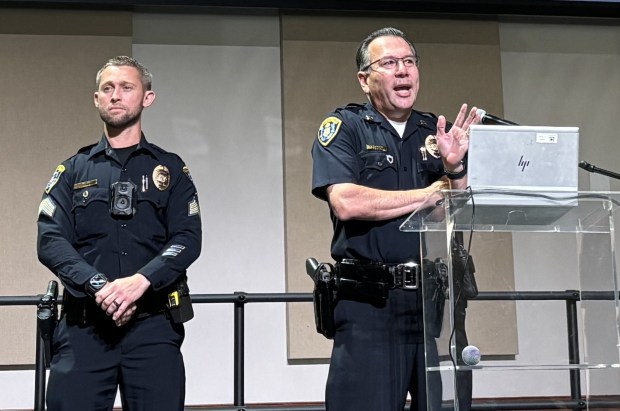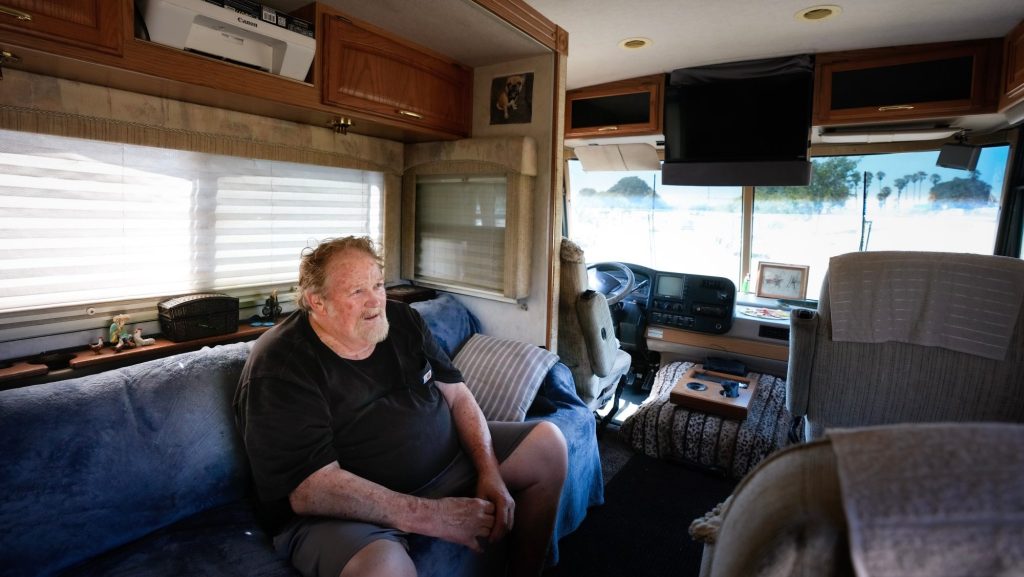Local ordinances that designate where and when people can park and live in their cars on San Diego streets have caused a stir in coastal neighborhoods.
Some community members want more law enforcement, while homeless advocates stress concerns.
To address residents’ concerns, the Pacific Beach Town Council, San Diego Police Department’s Neighborhood Policing Division, the mayor’s office and other coastal community partners held an Aug. 21 event at the Liberty Station Conference Center. It was designed so residents could learn more and ask questions about the vehicle habitation and oversized vehicle ordinances.
With the opening of the H Barracks safe parking site at 2209 Kincaid Road near Liberty Station this summer, SDPD’s Neighborhood Policing Division has been enabled to enforce ordinances that lay out vehicle habitation rules. The division partners with SDPD’s Western and Northern divisions by responding to vehicle habitation calls so local divisions can focus on other duties.
Capt. Stephen Shebloski from the Neighborhood Policing Division said the Vehicle Habitation Ordinance (VHO), passed in 2019, and the Oversized Vehicle Ordinance (OVO), extended in 2016, aim to redirect people living in their vehicles from street parking to designated “safe” parking sites. Safe parking lots are operated by Jewish Family Service of San Diego.
In addition to the H Barracks lot, they are lots on Aero Drive, Balboa Avenue, Mission Village Drive (Mission Valley) and Morena Boulevard (Rose Canyon).
“It starts with an attempt to make contact, to explain the law and explain that if a person obviously accepts and is willing to go to services, they’re not ticketed, they’re not subject to a violation,” Shebloski said. “It’s always about education and outreach first, but there has to be an enforcement component because the reality is many people don’t want to go to safe parking. … We need to make sure that those areas of the city, especially the beach areas, don’t become de-facto motorhome parks, and that there’s equitable access for everyone to those areas.”
The OVO prohibits recreational vehicle parking from 2 a.m. to 6 a.m. The VHO prohibits vehicle habitation from 9 p.m. to 6 a.m. It also bans vehicle habitation within 500 feet of a home or school at any time.
 SDPD Sgt. Mike Wallace and Capt. Stephen Shebloski give a presentation on the Oversized Vehicle and Vehicle Habitation ordinances on Aug. 21 at Liberty Station. (Elaine Alfaro)
SDPD Sgt. Mike Wallace and Capt. Stephen Shebloski give a presentation on the Oversized Vehicle and Vehicle Habitation ordinances on Aug. 21 at Liberty Station. (Elaine Alfaro)
Sgt. Michael Wallace said the hope, as police continue enforcement, is to help point people in the right direction and empower them to find more stable housing.
“If we can just get the people into housing or we can get them into placement, or we can hook them up with resources, that’s always going to be something we’re striving (for) and the goal we’re moving towards,” Wallace said.
Pacific Beach Town Council President Charlie Nieto said these ordinances are important to communities like PB due to the impact of vehicle habitation on public spaces.
“A lot of people have been angry and it’s largely, rightfully so, because, as much as you have to empathize with these people who are living in these vehicles because they (don’t) have somewhere else to go, Mission Bay Park is a big family space,” Nieto said. “When you have these really unsanitary, dangerous conditions, that also really hurts families. It’s like everybody loses.”
Wallace said the police department’s approach to enforcing the ordinances shifted during the past few years due to the COVID-19 pandemic, a lack of safe parking sites and pending litigation.
Plaintiffs from the Bloom et al v. San Diego class action lawsuit alleged violations of constitutional and statutory rights and challenged the two ordinances in November 2017. The argument centered on the fact that these people relied on their vehicles for shelter and could not access alternative housing.
The lawsuit was settled in 2024 and the city forgave outstanding tickets for those cited for parking oversized vehicles on city streets from Nov. 15, 2017 — the date the lawsuit was originally filed — through the settlement date, which the court approved in March 2024.
The settlement made a few changes to how the ordinances are enforced. The changes added a requirement of more outreach efforts in addition to enforcement and citations.
According to the mayor’s office, in mid-May SDPD’s Homeless Outreach Team officers began daily door-to-door outreach to RVs and oversized vehicles parked illegally to ensure their owners were aware of the ordinances and offer referrals to resources such as safe parking. Though enforcement began in early July, the education effort continues.
The settlement also required the city to provide additional options for legal nighttime parking.
Wallace said if safe parking spots are not available, more than 400 spots are offered citywide, police cannot enforce the ordinances. He said new changes to the ordinances have improved collaboration between police and the safe parking lots.
“Our biggest problem before with our lots is we didn’t have good communication when it came to the people that were running it,” Wallace said. “There was no dedicated 24 (hour) line that we dealt with. H Barracks wasn’t just the location, but it was location plus the personnel plus the ability to get live counting (and) live resources.”
 Pacific Beach Town Council President Charlie Nieto during the Aug. 21 event on the city’s Oversized Vehicle and Vehicle Habitation ordinances. (Elaine Alfaro)
Pacific Beach Town Council President Charlie Nieto during the Aug. 21 event on the city’s Oversized Vehicle and Vehicle Habitation ordinances. (Elaine Alfaro)
Police cannot tow vehicles as part of the ordinances’ enforcement, however they can tow for other violations.
Shebloski said the police department is doing its best to rise to the requirements of enforcement, but the timeframe of enforcing these ordinances poses a challenge to his 36-officer team.
“We don’t have the staffing to have officers work overnight hours,” Shebloski said. “I have to have officers come in early on overtime that volunteer to either adjust their shift or come in on overtime to work these special details to address these particular laws.”
Linda Conroy, a longtime Pacific Beach resident, said she attended the Aug. 21 presentation hoping to learn more about the ordinances.
“I just like to be more informed and find out who you can contact,” Conroy said.
According to Conroy, her neighborhood has been impacted by people who live in their vehicles. She said she’s tried to report vehicles to the city’s Get It Done app.
“The Mission Bay parking and Ski Beach parking and the RVs, they’re moving into the neighborhoods,” Conroy said. “I may end up with an RV in front of my house. You say something, or you take a picture to turn it into (the) San Diego Get It Done app, and they come out screaming at you and saying, ‘We have rights.’”
In a part of San Diego where parking is already difficult to find, Conroy said she wanted to better understand how these ordinances will make a difference.
“We all want it done overnight and that’s not gonna happen,” Conroy said. “I think they’re doing the best they can do with the limited guys that they have on duty. I think they need more officers. I think seeing more officers out and about helps a lot.”
Shebloski said from Aug. 1 to Aug. 15 the Neighborhood Policing Division issued 203 oversized vehicle citations and 329 parking citations for other violations. In addition, he said police referred 38 people to safe parking sites and 10 successfully moved on. July was the first month the department enforced the ordinances with the settlement changes since Shebloski moved to the division last year.
Advocates of people who live in their vehicles have published websites, such as vhosettlement.com, to help clarify people’s rights.
To learn more about both ordinances’ enforcement, visit tinyurl.com/SDPD-OVO and tinyurl.com/SDPD-VHO.
